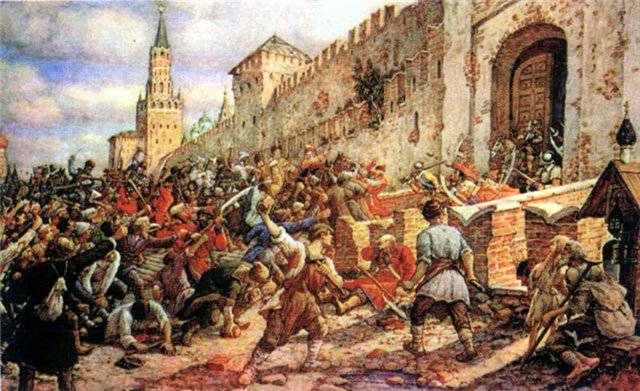14 June 1648 of the year in Moscow began a salt revolt

Traditionally, the reasons for 1648 Salt Riot are considered excessive taxes and corruption. The main claims were made to the tax policy of Alexei Mikhailovich, besides, the young tsar inherited a serious public discontent with taxes. The Morozov government decided to defuse the situation by reducing and eliminating some direct taxes in 1646 by introducing indirect taxes instead. Economists believe that indirect taxes, which are included in the price of goods, are perceived by the population better than direct taxes collected directly from the population, since they are less noticeable. However, in the Moscow kingdom, the effects of imposing indirect taxes were too obvious: the price of salt rose 4 times (from 5-kopeks to 20-ti). Salt was at that time (as, indeed, now) a basic commodity providing long-term preservation of products. It turned out that the tax was palpable even for the poorest segments of the population. Even people who were on the state service, who, in addition to price increases for their products, had to face a significant salary reduction, were under attack. After seeing the results of intervention in the tax system, in 1647, Morozov abolished indirect taxes, returning the former direct ones. However, their size still remained very significant.
The then corrupt officials made their contribution to the emergence of the Moscow 1648 Salt Riot. The foreigners who stayed in the Moscow kingdom at that time noted that those who were more inclined to Morozov received what they wanted. Bribes were taken by smaller officials and judges.
History The salt rebellion begins on 1 (14) on June 1648, when Muscovites decided to give Alexey Mikhailovich a petition for exorbitant taxes and bribery of the boyars with the proposal to convene the Zemsky Sobor. The practice of submitting petitions with such proposals was quite normal for that time. However, the boyar Morozov considered it best to disperse the crowd that surrounded the tsar, who was returning from the Trinity-Sergiev monastery. Despite the fact that even those close to the king were stung by stones thrown from the crowd, on that day the archers still managed to clear the way for the royal pilgrims.
The next day, the townspeople came to the Kremlin with a petition. However, the boyars simply tore up the petition in front of the crowd. From that moment in the city began a great distemper. The archers, offended by the decrease in their allowances, joined the poor strata of Moscow. For several days, the rioters sought out the boyars they particularly hated. As a result, the author of the salt tax, Nazariy Purea, was killed, several boyars were executed, associated with this tax and seen in bribery. But the king did not betray Morozov (after all, he was his tutor), banishing him to the Kirillo-Belozersky monastery.
In order to calm the crowd, the government made substantial concessions: consent was given to holding the Zemsky Sobor to adopt the new Council Code, a deferment was given in paying taxes, many judges were replaced. The Zemsky Sobor was convened as early as July 1648. A year later, as a result of its work, the Council Code was adopted - a landmark legislative act of pre-imperial Russia.
Immediate participants in the rebellion were prepared for a different fate: the archers received a substantial addition to the salary, and serfs who took an active part in the riots were executed.
Information